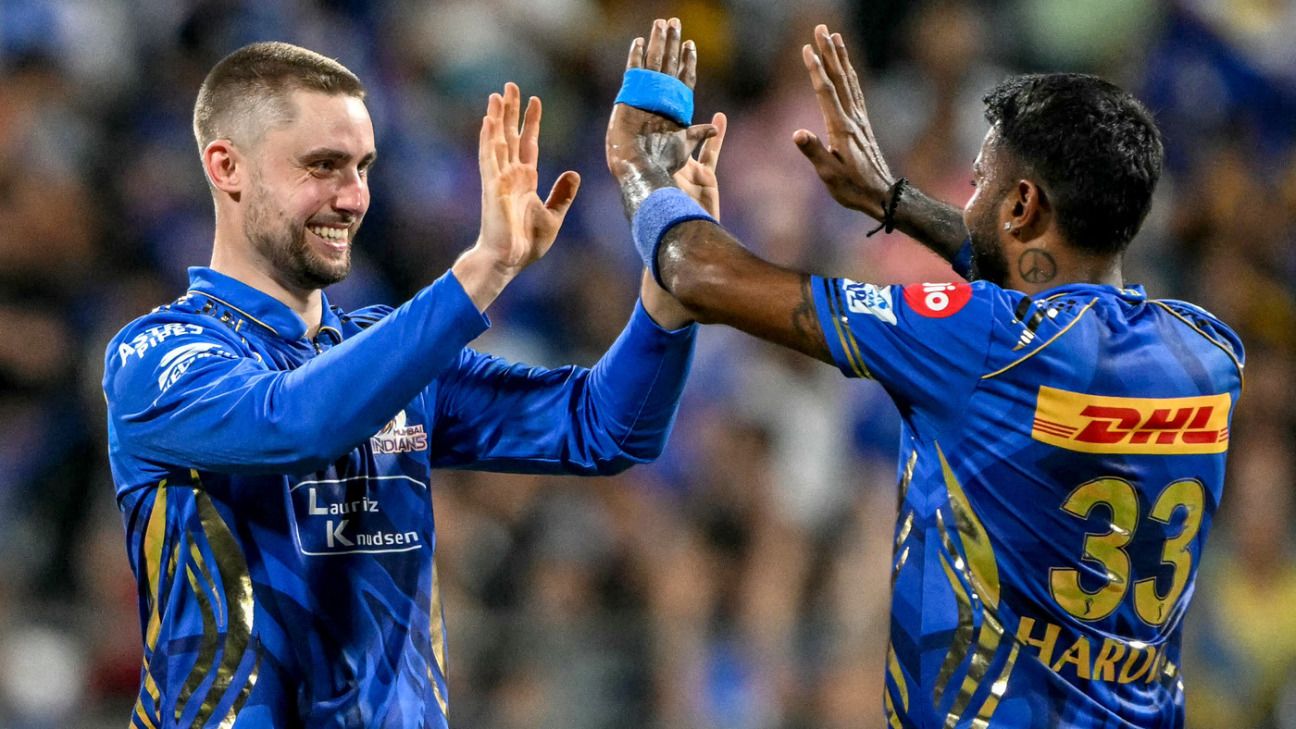 |
|
The Mumbai Indians (MI) secured a strategic victory by winning the toss and subsequently limiting the Sunrisers Hyderabad (SRH) to a total of 162 for 5 wickets at the Wankhede Stadium. This performance was particularly notable given the prevailing conditions of an unusually sluggish pitch and the potential influence of dew later in the game. MI's bowling attack demonstrated discipline and adaptability, employing variations in pace and a consistent barrage of yorkers throughout the SRH innings. This strategy effectively suppressed SRH's scoring momentum, despite an initial opening partnership of 59 runs between Abhishek Sharma and Travis Head. The SRH innings only managed to surpass the 160-run mark due to two explosive overs at the tail end, the 18th and 20th, which yielded 21 runs each. These overs, bowled by Deepak Chahar and Hardik Pandya respectively, were punctuated by five sixes, representing the entirety of SRH's six-hitting for the entire innings. While individual batsmen like Heinrich Klaasen and Aniket Verma showcased impressive hitting, a significant observation was that three of the sixes were a direct result of full-toss deliveries.
The prevalence of full-tosses, totaling seven in the final three overs, raised speculations about the potential onset of dew, which could have implications for the chasing team by making batting more favorable. One of these full-tosses led to the dismissal of Heinrich Klaasen, as he attempted to create room for himself but was bowled. The delivery came from Jasprit Bumrah, renowned for his challenging full-tosses. Bumrah's contribution of 1 for 21 in his four overs, with two overs bowled in the powerplay, set a disciplined tone for the MI bowling attack. However, the standout performer among MI's bowlers was Will Jacks, who achieved remarkable figures of 2 for 14 in his three overs. Jacks, an offspinner, was strategically deployed immediately after the powerplay to exploit the presence of SRH's left-handed top-order batsmen. He successfully extracted ample grip from the surface, leading to the crucial wickets of Ishan Kishan and Travis Head.
Jacks' performance not only dominated his specific matchups but also provided MI with crucial breathing room, particularly after an unfortunate injury to their legspinner, Karn Sharma, in the third over. Karn, who had been named Player of the Match in their previous encounter against the Delhi Capitals, sustained what appeared to be a split webbing after diving forward at midwicket in an attempt to catch a ball that fell just short of him. Jacks' ability to bowl three overs allowed MI to avoid replacing Karn with another bowler, affording them the flexibility to introduce Rohit Sharma as their Impact Player at the beginning of their chase. Furthermore, Jacks' overs enabled MI to limit Mitchell Santner's left-arm spin to just one over against a team with a substantial number of left-handed batsmen, demonstrating a tactical adjustment based on the game's evolving circumstances.
The near-miss catch that caused Karn Sharma's injury marked the second instance in three overs where a ball failed to carry to him at midwicket. SRH's top order had previously faced a period of unfavorable luck during their recent streak of four consecutive defeats. However, their fortunes seemed to have shifted when Abhishek Sharma's exceptional century propelled them to a successful chase of 246 in their previous match against the Punjab Kings. The element of luck continued to favor SRH at the outset of this game, with Jacks dropping a catch off Abhishek's edge on the very first ball, and later, Travis Head being caught off a no-ball.
Despite these instances of luck, SRH struggled to maintain a consistent scoring rate. When Travis Head was eventually caught off the no-ball from Hardik Pandya in the 10th over, he had only managed to score 24 runs off 24 balls. He was subsequently dismissed for 28 runs off 29 balls. Abhishek Sharma displayed slightly more fluency, scoring 40 runs off 28 balls, including seven boundaries.
Hardik Pandya, after enduring a significant injury scare, successfully broke the opening partnership in the eighth over by dismissing Abhishek Sharma, who was caught on the point boundary. Pandya appeared to have injured either his left shin or ankle during his follow-through after delivering the preceding ball, and initially signaled to the MI dugout that he might require a substitute. However, he managed to recover and continue bowling. The overall analysis reveals a strategic and tactical battle, where MI's disciplined bowling, coupled with astute field placements and the ability to capitalize on key moments, played a pivotal role in restricting SRH to a manageable total, setting the stage for a potentially successful chase.
